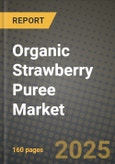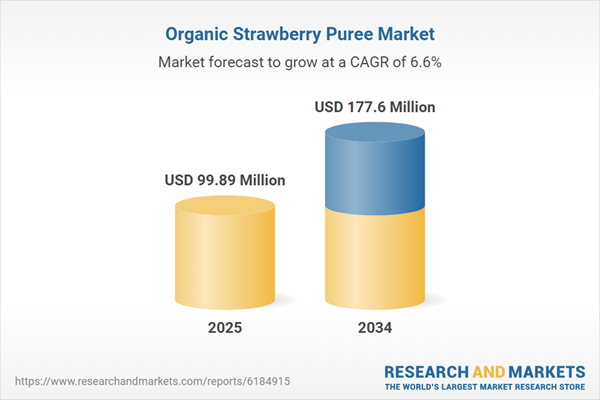Organic Strawberry Puree Market
Organic strawberry purée is a minimally processed, pasteurized or aseptically packed fruit base produced from certified-organic strawberries, valued for its bright color, authentic flavor, and clean-label positioning across beverages, dairy, baby food, desserts, and bakery. Leading end uses include smoothies and juices, yogurt and ice-cream swirls, baby purées and pouches, jams and toppings, RTD cocktails/mocktails, bakery fillings, and functional nutrition blends. Key trends include short-ingredient lists, “no added sugar” or reduced-sugar formulations leveraging fruit solids, provenance storytelling, and year-round menu innovation in foodservice. Demand is propelled by rising organic adoption, premiumization in dairy and frozen desserts, and the shift from artificial flavors to real fruit for color and taste. Supply-side strategies focus on agronomy for flavor intensity and Brix, residue-free cultivation, varietal selection for color stability, and harvest-to-pack speed to preserve aroma volatiles. Processors differentiate via aseptic technology, seed management options (with/without), custom Brix/pH targets, and micro-cut or fiber-retained textures optimized for specific applications. Competitive alternatives include conventional purée, concentrates, flavor systems, and frozen IQF berries; organic purée wins where label claims, natural color, and authentic sensory cues justify a premium. Logistics, seasonality, and climate risk elevate the role of multi-origin sourcing, frozen-to-aseptic conversion capacity, and stringent cold-chain or ambient storage protocols depending on pack type. Certifications (USDA/EU organic), allergen and traceability documentation, and sustainability narratives around water, soil health, and grower equity shape customer preferences. Overall, the category blends terroir and technology, enabling brands to deliver vibrant fruit experiences aligned with clean-label and wellness expectations.Organic Strawberry Puree Market Key Insights
- Application hot spots are broadening. Beyond baby food and dairy, mixology, craft sodas, kombucha, and functional smoothies are scaling usage; bakery and foodservice leverage purée for glazes, fillings, and warm sauces, while frozen novelty formats use fruit swirls to replace artificial color and flavor in premium SKUs.
- Provenance and varietal choice drive premium cues. Processors highlight farm networks, organic field practices, and select cultivars known for color density and aromatic esters; terroir stories, fair grower contracts, and residue-free claims resonate with retailers and QSR innovators targeting seasonal or LTO menus.
- Aseptic is becoming the default for flexibility. Shelf-stable totes and bag-in-box reduce thaw time and warehouse complexity compared with frozen blocks; validated lethality, low oxygen pickup, and gentle heat profiles protect color and flavor while enabling ambient transport and rapid plant changeovers.
- Texture and seed control tailor performance. Micro-cut purées suit beverages and straws; seed-out options reduce grittiness for pouches and sauces; higher fiber retention supports body in smoothies and clean-label viscosity in dairy and desserts without added stabilizers.
- Sugar management is central to claims. Custom Brix targets, partial blend with low-Brix purées, and pairing with prebiotic fibers allow “no added sugar” or reduced-sugar statements, while taste remains bright. Developers watch pH/acid balance to protect flavor and microbial stability.
- Color stability requires disciplined processing. Rapid blanching and de-aeration, antioxidant management, and low-oxygen filling minimize browning; cold-fill/cold-chain or aseptic protocols preserve anthocyanins. Packaging with oxygen barriers and light protection extends shelf life in retail and foodservice formats.
- Supply assurance depends on multi-origin strategies. Northern and southern hemisphere crop calendars, contracted acreage, and frozen inventory buffers de-risk seasonality and weather volatility; processors with in-house pulping and tolling options can pivot between fresh, IQF, and purée inputs as conditions shift.
- Documentation and audit readiness win RFPs. Organic certifications for each link, allergen controls, pesticide residue testing, and full traceability are prerequisites for baby, kids, and school channels; change-control and spec discipline shorten approvals for multinational launches.
- Sustainability and grower programs add value. Water stewardship, soil health, integrated pest management, recyclable packaging, and farmworker welfare initiatives strengthen brand narratives; transport optimization and energy-efficient thermal processes reduce the embedded footprint per kilogram delivered.
- Innovation leans into blends and formats. Co-purées with banana, apple, or tropicals modulate cost and flavor; strawberry-basil, strawberry-mint, or strawberry-rhubarb elevate culinary interest. Single-serve aseptic packs for bar programs and foodservice help portion control and reduce waste.
Organic Strawberry Puree Market Reginal Analysis
North America
Demand is anchored in organic dairy, baby food pouches, smoothies, and frozen desserts. Foodservice and beverage brands expand seasonal strawberry SKUs, while retailers push private-label organics. Buyers expect robust certifications, seed-out options, and tailored Brix/pH. Multi-origin sourcing and aseptic totes are favored to navigate weather swings and labor constraints in key growing regions. Sustainability reporting and supplier transparency increasingly influence category resets.Europe
Mature organic penetration supports steady uptake across yogurt, bakery, and ambient desserts. Strict labeling and additive scrutiny favor clean-label purées with minimal processing aids. Provenance, fair grower relationships, and recyclable packaging are emphasized by retailers. Customers prefer consistent color stability and low oxygen pickup for ambient pastries and dairy; baby food manufacturers require tight spec windows and comprehensive contaminant testing.Asia-Pacific
Rising middle-class adoption of organic and premium dairy drives growth; cafés and beverage chains popularize strawberry smoothies and RTD fruit drinks. Import reliance mixes with expanding regional organic cultivation, prompting interest in aseptic formats and frozen-to-purée conversions. Halal certifications and localization of sweetness/acid profiles are common requests. E-commerce brands value small-format packs and ready-to-blend bases for home smoothies.Middle East & Africa
Premium hospitality, café culture, and modern trade fuel demand for dessert toppings, smoothies, and bakery. Import-dependent buyers prioritize shelf stability, documentation integrity, and halal certification. High ambient temperatures make aseptic, light-protected packaging attractive. Distributors with cold-chain and portion-controlled formats gain share, especially in quick-serve beverage programs.South & Central America
Regional dessert and bakery traditions adopt organic strawberry purée for fillings and toppings, while juice bars and ice-cream shops expand usage. Local cultivation varies; processors blend regional fruit with imports to ensure year-round supply and color consistency. Retailers trial private-label organic lines, favoring cost-effective blends that maintain flavor authenticity. Documentation, traceability, and flexible pack sizes are key to managing demand variability across channels.Organic Strawberry Puree Market Segmentation
By Type
- Room Temperature Storage
- Low Temperature Storage
By End-User
- Food and Beverage
- Foodservice
- Household
- Others
By Distribution Channel
- Business to Business
- Business to Consumer
Key Market players
Del Carmen Foods, Finest Call, Piccolo, Monin, Torani, Sunimpex, Les Vergers Boiron, White Toque, Shimlahills, TreeTop Fruit Ingredients, Gourmet Food World LLC, Vitabio, Eden Foods, Smucker’s, Lemon ConcentrateOrganic Strawberry Puree Market Analytics
The report employs rigorous tools, including Porter’s Five Forces, value chain mapping, and scenario-based modelling, to assess supply-demand dynamics. Cross-sector influences from parent, derived, and substitute markets are evaluated to identify risks and opportunities. Trade and pricing analytics provide an up-to-date view of international flows, including leading exporters, importers, and regional price trends.Macroeconomic indicators, policy frameworks such as carbon pricing and energy security strategies, and evolving consumer behaviour are considered in forecasting scenarios. Recent deal flows, partnerships, and technology innovations are incorporated to assess their impact on future market performance.
Organic Strawberry Puree Market Competitive Intelligence
The competitive landscape is mapped through proprietary frameworks, profiling leading companies with details on business models, product portfolios, financial performance, and strategic initiatives. Key developments such as mergers & acquisitions, technology collaborations, investment inflows, and regional expansions are analyzed for their competitive impact. The report also identifies emerging players and innovative startups contributing to market disruption.Regional insights highlight the most promising investment destinations, regulatory landscapes, and evolving partnerships across energy and industrial corridors.
Countries Covered
- North America - Organic Strawberry Puree market data and outlook to 2034
- United States
- Canada
- Mexico
- Europe - Organic Strawberry Puree market data and outlook to 2034
- Germany
- United Kingdom
- France
- Italy
- Spain
- BeNeLux
- Russia
- Sweden
- Asia-Pacific - Organic Strawberry Puree market data and outlook to 2034
- China
- Japan
- India
- South Korea
- Australia
- Indonesia
- Malaysia
- Vietnam
- Middle East and Africa - Organic Strawberry Puree market data and outlook to 2034
- Saudi Arabia
- South Africa
- Iran
- UAE
- Egypt
- South and Central America - Organic Strawberry Puree market data and outlook to 2034
- Brazil
- Argentina
- Chile
- Peru
Research Methodology
This study combines primary inputs from industry experts across the Organic Strawberry Puree value chain with secondary data from associations, government publications, trade databases, and company disclosures. Proprietary modeling techniques, including data triangulation, statistical correlation, and scenario planning, are applied to deliver reliable market sizing and forecasting.Key Questions Addressed
- What is the current and forecast market size of the Organic Strawberry Puree industry at global, regional, and country levels?
- Which types, applications, and technologies present the highest growth potential?
- How are supply chains adapting to geopolitical and economic shocks?
- What role do policy frameworks, trade flows, and sustainability targets play in shaping demand?
- Who are the leading players, and how are their strategies evolving in the face of global uncertainty?
- Which regional “hotspots” and customer segments will outpace the market, and what go-to-market and partnership models best support entry and expansion?
- Where are the most investable opportunities - across technology roadmaps, sustainability-linked innovation, and M&A - and what is the best segment to invest over the next 3-5 years?
Your Key Takeaways from the Organic Strawberry Puree Market Report
- Global Organic Strawberry Puree market size and growth projections (CAGR), 2024-2034
- Impact of Russia-Ukraine, Israel-Palestine, and Hamas conflicts on Organic Strawberry Puree trade, costs, and supply chains
- Organic Strawberry Puree market size, share, and outlook across 5 regions and 27 countries, 2023-2034
- Organic Strawberry Puree market size, CAGR, and market share of key products, applications, and end-user verticals, 2023-2034
- Short- and long-term Organic Strawberry Puree market trends, drivers, restraints, and opportunities
- Porter’s Five Forces analysis, technological developments, and Organic Strawberry Puree supply chain analysis
- Organic Strawberry Puree trade analysis, Organic Strawberry Puree market price analysis, and Organic Strawberry Puree supply/demand dynamics
- Profiles of 5 leading companies - overview, key strategies, financials, and products
- Latest Organic Strawberry Puree market news and developments
Additional Support
With the purchase of this report, you will receive:- An updated PDF report and an MS Excel data workbook containing all market tables and figures for easy analysis.
- 7-day post-sale analyst support for clarifications and in-scope supplementary data, ensuring the deliverable aligns precisely with your requirements.
- Complimentary report update to incorporate the latest available data and the impact of recent market developments.
This product will be delivered within 1-3 business days.
Table of Contents
Companies Mentioned
- Del Carmen Foods
- Finest Call
- Piccolo
- Monin
- Torani
- Sunimpex
- Les Vergers Boiron
- White Toque
- Shimlahills
- TreeTop Fruit Ingredients
- Gourmet Food World LLC
- Vitabio
- Eden Foods
- Smucker’s
- Lemon Concentrate
Table Information
| Report Attribute | Details |
|---|---|
| No. of Pages | 160 |
| Published | November 2025 |
| Forecast Period | 2025 - 2034 |
| Estimated Market Value ( USD | $ 99.89 Million |
| Forecasted Market Value ( USD | $ 177.6 Million |
| Compound Annual Growth Rate | 6.6% |
| Regions Covered | Global |
| No. of Companies Mentioned | 15 |









